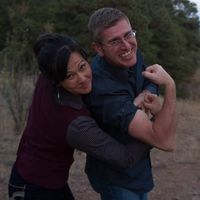Dec '24 (edited) • General discussion
Chanukah or Christmas?
This isn't about debating which. I used a question as a title for the sake of answering why my family chose Chanukah.
Believe it or not, not everyone who does Chanukah does so because it is a "Jewish" Holiday/Festival. It's not a commanded Feast like Tabernacles (Sukkot), Passover (Pesach), and Pentecost (Shavuot). The reason Judaica (Orthodox to Progressive to Messianic to Hebrew Roots) choose Chanukah is because of its Jewish/Hebraic cultural beginning. Most, at least, in those circles who choose it over Christmas, are doing so for this reason, but not all are. [They] celebrate the retaking of the Temple by the Maccabbees and the "Chanukah Miracle" of a single day's oil lasting 8 days.
To be honest that miracle can't be verified by any relevant source. But that's not why my family chooses to celebrate Chanukah over Christmas anyways. I'm neither for nor against the "Chanukah Miracle". It's simply not relevant to me.
The story of Messiah's birth in Luke 2 is why I choose Chanukah.
The story gives us all the clues we need, to understand what time of year it was. The census of Rome would have been done during a time when it was easiest to get all of the MEN counted and determine the size of their families and their income source. Clearly the easiest time would have been during a COMMANDED Feast. Only 1 of the 3 commanded Feasts fits the bill because of what we see with the shepherds.
They were on a hillside, which means they'd climbed in elevation away from the typical pasturland. Customarily this was done during Fall into Winter in order to preserve what pasturland they had below for the cold months ahead. It was also because the "former rain" that came as part of their twice a year rainy seasons. It would create quite a deluge of water in the lower lands and having their flock trampling on it would be a surefire way of killing the grasses off for months to come, a bad strategy when you need to be able to feed them close to home because of the unpredictable nature of winter weather, especially in higher elevations.
Chanukah, as seen in John 10, comes during the darkest part of the year. When darkness and light are equalized and the light doesn't last longer than the darkness. Which is probably at least partly why it's known as the Festival of Lights. The other being the story of the Chanukah Miracle when the oil for the Menorah, in the re-dedicated Temple, lasted 7 days longer than it should have.
If we piece the evidence given from culture, customary movement of the flocks, weather patterns still seen in Israel even today and described in many places of Scripture (like when Joel mentioned the former and latter rain), and frankly a little common sense... there really is but one choice for when Yeshua/Jesus was born. The 1st Day of Sukkot/Tabernacles.
Here is more evidence...
I mentioned the Roman Census and why it would have been done near a Feast, but why Sukkot? The harvest of much of the produce, in Israel, is in the Spring - opposite of the US. The farmers of such would have had to either bring all of their harvest offering with them PLUS the amount needed for the Feast of Pesach (which happens in the Spring) OR sell enough of it to buy provisions for the Feast once arriving in Jerusalem - AFTER a lengthy harvest. Let's not forget all the preparation for Unleavened bread (which requires a complete emptying of the home of all forms of yeast). Oh, and the Lamb that needed chosen, and the wait for the priests to sacrifice them. Then there's the business of the scapegoat. AND the wave offering... Can you see why common sense eliminates this as an option since the Romans would clearly have had a riot on their hands, the likes of which hadn't been seen since the Maccabees, if they'd try to do a census during Passover?
So then what about Pentecost? The men were commanded to be at the Temple IN PRAYER for a great deal of Pentecost/Shavuot. How could Rome think they'd get an accurate count if the men were more devout to God than to the Emperor? It just doesn't make much sense. We see in Acts 2 that Peter even made a point that there was no way they could be drunk, the drinking hadn't started yet, because it was one of the times of prayer.
Shavuot does make sense and here's why. The men would have planned far enough in advance to be there early enough to build their sukkah (temporary dwelling place). There's nothing in Torah saying they could not take a break from doing so, to go register. Not to mention waiting in line at the city gates would have been normal, as camels were unloaded to "pass through the eye of the needle" to ensure no one was smuggling undeclared goods into the city. So registering while waiting would have made sense. Also, traveling at Sukkot, in the fall to winter months, would have been less taxing on animals who wouldneed much more water in hotter monthslike around Pentecost/Shavuot. The people would band together for communuty meals and fires along the way which made many treacherous routes safer. Further, the men would not have been as committed to things which could not be interrupted, like prayer.
Here another interesting point. The Hebrew word sukkah, can also refer to a stable because animals only stayed in them during inclimate weather. Even the stone carved "manger" can be a sukkah because a child outgrows them. So with a pregnant wife who goes into labor, Yoseph would not have been in violation of building a sukkah by staying in a stable. It wasn't about MONEY, there was no room at the INN, a temporary place to dwell while in Jerusalem, so they opted for ANOTHER form of acceptable.temorary dwelling!!
[That last statement get me into trouble with many, because they believe Romanists added the part about the inn to create a Christmas narrative. But in proper context, can you see it doesn't matter? It's about the temporary dwelling, regardless which reference we focus on, stable, manger, or inn.]
Here's a BIG ONE. Yeshua/Jesus "took on flesh" as a temporary dwelling place and thus Tabernacled among us.
Now how does this fit with Chanukah? Take a Hebrew Calendar, even the one used today. No special calendar needed, none. Not a Zadok, or otherwise... Then count backwards from the date of the 1st Day of Sukkot, and you arrive on the 1st day of Chanukah.
We celebrate not only His birth, but His conception!! He was placed in the womb of Miriam on the 1st day of the Festival of Lights. The Light of the World LITERALLY came into the world when His chosen people celebrated the Miracle of Light!!
No it's not required that we celebrate Chanukah. But with the only sources for the Christendom celebration of Christmas being pre-Vatican Catholicsm, and the symbolism behind the various aspects of Christmas being parallel to pagan sources, should we perhaps take a closer look at the real Reason for the Season and determine if there is a necessary shift in our beliefs?
We are not commanded to celebrate HIS birthday anywhere in Scripture. But is it bad to?
If we chose to, should we maybe consider the facts above, all of which you can easily verify?
Should we perhaps consider that Chanukah isn't Jewish, but simply began that way, solely from our Westerm perspective? That perhaps, just perhaps, since the Light "of the WORLD" came for The World, that maybe the Symbolism found in Chanukah is just as much for the whole world as we've made out of the Catholic holiday of Christmas?
Even the man they claim Santa Claus was modeled after, St. Niklaus, was a Byzantine priest against Rome at the Council of Nicaea and was martyred for it. By the way, some records show he was also Torah Obedient in many ways. But that's not taught about him at all, is it?
Peace to us all, my family in Messiah/Christ. Happy Chanukah (which begins at sunset today - this year).
4
5 comments

skool.com/faith-flex-4860
Uncover the origins of your faith! Join our diverse community. Explore ancient history, archaeology, and faith traditions. Engage with experts.
Powered by





